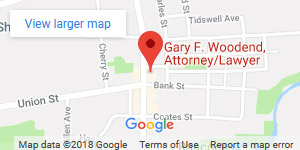We hope you find this information helpful, but we are no longer handling bankruptcy cases. CAUTION: Some of the information is not up-to-date, e.g., exemptions, etc. Thank you and best of luck.
Chapter 13 Bankruptcy
There are three basic forms of bankruptcy. Chapter 7, Chapter 11, and Chapter 13. Chapter 13 bankruptcy is essentially a wage earner’s reorganization bankruptcy. In a Chapter 13 bankruptcy, you make arrangements to repay your creditors what they are entitled to receive under the Bankruptcy Code over a period not to exceed sixty months. For many years, Chapter 13 bankruptcies were primarily used for folks that had fallen behind on their mortgage, and wanted to save their homes by curing the arrearages over a period of time. It is still used for that purpose, however, as a result of the Bankruptcy Reform Act, people with assets or income in excess of the established thresholds must file a Chapter 13 bankruptcy rather than a Chapter 7 bankruptcy. All bankruptcies are permitted to appear on your credit history report for a period of ten (10) years. You can only obtain a discharge of bankruptcy once every six years.
A Chapter 13 bankruptcy is a very powerful tool if you are behind on your mortgage. If you are behind on your mortgage payments, and you are unable to negotiate a work out plan with your mortgage company, you can file a Chapter 13 bankruptcy in which you propose to repay your mortgage arrears over the duration of the Chapter 13 plan. In most states, the filing of a Chapter 13 bankruptcy immediately stops foreclosure proceedings, provided the bankruptcy is filed before your property goes to sheriff sale. It is important to know that a Chapter 13 bankruptcy addresses only the mortgage payments you missed prior to the date of the filing of the bankruptcy petition. And, you must begin paying your regular, monthly mortgage payments on-time each and every month after the date of the filing of the petition. It does not change your obligation to pay future mortgage payments, nor does it change the amount of your monthly payment. These would be a matter of negotiation directly with your mortgage lender.
Not everyone qualifies for a Chapter 13 bankruptcy. In your bankruptcy petition, you must provide the court with a detailed statement of your monthly income and expenditures. If it appears on paper that you cannot make the estimated, monthly payments to the bankruptcy trustee in addition to your everyday, ongoing monthly living expenses, your Chapter 13 plan will not be approved and your case will either be dismissed or converted to a Chapter 7 bankruptcy. Furthermore, even if your bankruptcy petition shows on paper that you can make it work, but you do not do so in practice over the course of the remainder of the Chapter 13 bankruptcy plan, your case will either be dismissed or converted to a Chapter 7 bankruptcy.




